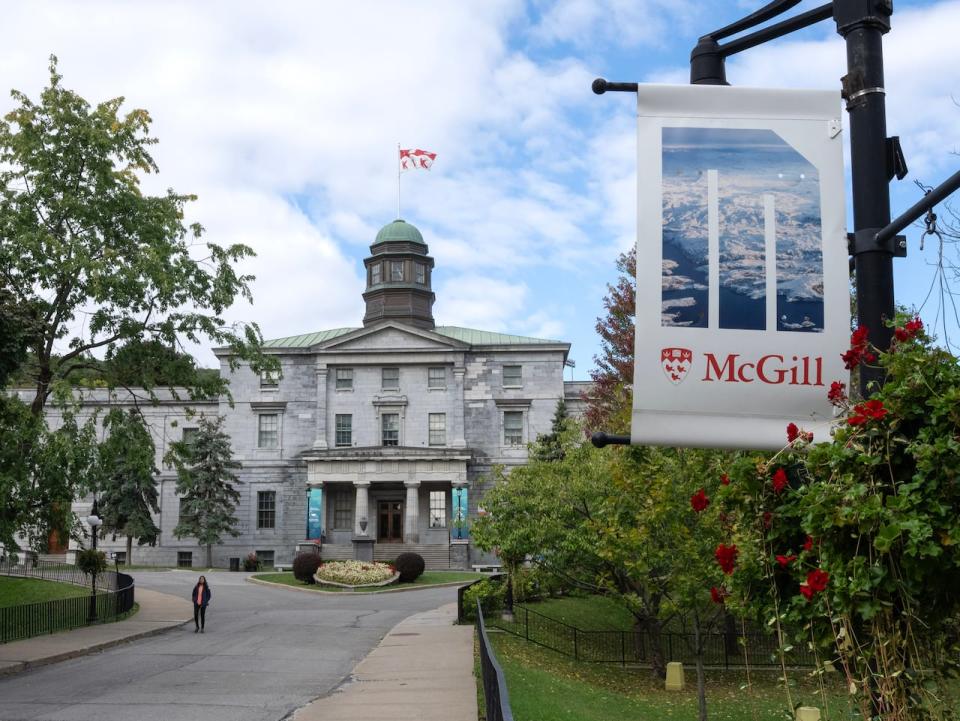McGill University sees 'catastrophic' drop in applications with tuition hike looming

Facing tuition hikes for out-province and international students, two of Quebec's most prominent English-language institutions, McGill University and Concordia University, are seeing double-digit drops in applications.
The potential for fewer students, coupled with the risk of potential credit rating downgrades, is raising concern at the schools about their financial stability unless the Quebec government reverses course.
In October, the Coalition Avenir Québec government announced it intends to nearly double tuition fees from about $9,000 to $17,000 for undergraduate students and non-research graduate students from other provinces. Tuition for international students will rise even higher.
But the fees won't go into McGill or Concordia's coffers.
The government says the extra funds coming in — estimated to be about $110 million a year — will be redistributed across universities, especially French-language institutions, in an effort to bolster French.
Speaking at an event Thursday hosted by the Conseil des relations internationales de Montréal, a non-profit organization that promotes knowledge of international affairs, Deep Saini, McGill's principal, warned that the financial consequences for the university will be considerable, and the effect is already being felt.
So far, applications are down by 20 per cent, he said, a drop he described as "catastrophic."
Earlier this month, McGill announced a hiring freeze effective immediately due to the "severe, adverse financial impact" of Quebec's plan.

Deep Saini, McGill’s principal, described the 20 per cent in applications as “catastrophic.” (Dalhousie University)
"If the damage goes as high as our initial predictions were, then all bets are off," he said, adding that any downgrade in its credit rating would deliver a massive blow to the school while it's spending nearly $1 billion on major infrastructure projects.
"At this point we are looking at tens of millions of dollars in damage to McGill, and not just to McGill, [but] to the Quebec government [too] because some of these projects are funded by the Quebec government."
Saini said the province as a whole loses when it attracts less talent, investment and business.
"It's giving Quebec a black eye already," he said.
Concordia University, which is also seeing a drop in applications, is again calling on the Legault government to at least delay its plan until 2025.
"We're already seeing a 16 per cent decline in applications from the rest of Canada and equally or perhaps even more worrisome a 33 per cent decline in applications internationally," said Concordia president Graham Carr.
Estimating a 10 per cent reduction in its operating budget, Carr isn't ruling out reconsidering the infrastructure projects it had planned and how it delivers its courses.
Carr said the universities had warned the Quebec government that their credit might be downgraded if the government continued on its course.

Concordia president Graham Carr says the university is seeing a 16 per cent drop in applications from out-of-province students and a 33 per cent drop in international applications. (Concordia University)
"We've had a very favourable credit rating from Moody's up to now. It will depend on what the government announces, but obviously if the price of borrowing goes higher and higher, that's less money that we can use to do what we should be doing, which is supporting teaching and learning and research in the university," he said.
Like McGill, Concordia has put in place a hiring freeze. Carr said he hopes it doesn't lead to layoffs, but everything is under review with the university facing losses in students and revenue.
Lower credit, higher interest rates
Michael Yake, associate managing director at Moody's Canada, told CBC that the universities' current credit ratings are high among education establishments, not just in Canada but across the globe as well.
However, Yake says, there are indications their fortunes may take a turn for the worse depending on what actions the Quebec government takes. And how the universities deal with those developments also plays a role.
"The review for downgrade highlights that the pressure is negative. We see that there could be consequences to both McGill and Concordia in terms of their credit strength based on the announcement of the province," said Yake.
What effect would a downgrade have on the universities?
In short, lower credit ratings may mean higher interest rates for McGill and Concordia, making it more expensive to take out loans at a time when both schools are spending big to expand.
"When you're issuing and borrowing hundreds of millions of dollars, every little additional interest rate or or percentage of an interest rate could have an impact on that," said Yake.
Quebec's Higher Education Ministry did not respond to a request to comment from CBC News about the universities' drop in applications.

